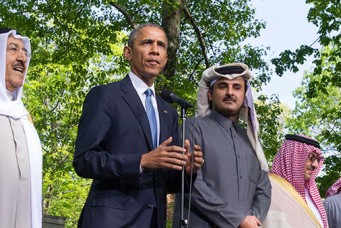Terror Will Be a Blight on the Obama Legacy
This is a bitter legacy for the past three American administrations and for all their international partners in inhuman, uncaring policies that have wrecked the lives and futures of hundreds of millions of people.
One of the great battles underway now in the United States is between people of different ideological stripes who seek to write President Barack Obama’s legacy before he leaves office. This is mostly meaningless political entertainment that continues in another form the profound policy disagreements and character attacks that defined the recent presidential campaign. Yet one important episode that just occurred strikes me as worth analyzing in greater depth, because it was President Obama himself who made a speech this week in which he sought to defend his anti-terror strategy as a success.
The facts suggest otherwise, and Americans and their friends around the world should decisively hold the United States accountable for the way it has pursued its anti-terror goals—because of the immense impact these policies have had and will continue to have for many years in cases like Afghanistan and Iraq.
Obama’s main point in his address to troops at MacDill Air Force Base in Tampa, Florida, was that he made the right decision in scaling back huge American military engagements around the world in favor of more targeted special operations and developing a “network of partners” to fight the terrorists. He said the terror threat remains real and dangerous, but that today’s extremists, unlike communists and fascists, do not threaten the world order.
He thanks the troops for their role in “breaking the back” of the Islamic State (ISIS) in Syria and Iraq, noting these people “are thugs and murderers who should be treated that way. He added that the United States’ “smart strategy that can be sustained” had successfully prevented another major terror attack on its soil since September 11, 2001.
Like most politicians, Obama here speaks both sense and nonsense at the same time. He is correct to note that no major terror attack has occurred in the United States for the past 15 years, but he ventures into the world of make-believe and wishful thinking when he says that his strategy of destroying terror installations and leaders by building a network of allies can be sustained as a long-term successful strategy.
The most important point is that his focus on destroying the actual terrorists and their networks and facilities is important and legitimate, but this will not rid the world of the terror threat in the years ahead. The United States’ use of military power against terrorists has been decisive and impressive since the fight against them was launched in the 1990s by President Bill Clinton; yet even more striking has been the virtually total refusal or inability of the United States (and its network of Arab and Asian allies) to identify and seek to redress the underlying causes that allowed so many terror groups to emerge in the past quarter century or so.
The fight against Al-Qaeda is most instructive here, because the United States has a longer experience in this battle than it does against ISIS (which in any case emerged from within Al-Qaeda, showing the weaknesses of the American strategy to fight terror). The United States under the past three presidents (Clinton, Bush and Obama) has used immense military force against Al-Qaeda for nearly two decades, using the same strategy that Obama boasts of today. Yet we find today that Al-Qaeda has expanded in those past 20 years, has been deeply involved in the fighting in Syria, and on the way it spawned the group in Iraq that later became ISIS.
Similarly, the United States has been fighting the Taliban in Afghanistan for decades, only to find today that the Taliban have resumed expanding their significant control of territory in the country, while some 12,000 American and other troops continue to fight there.
The second critical flaw in the U.S. strategy is that its “allies” in the Arab-Asian region where terror is most troubling are mostly autocratic governments whose policies of socio-economic mismanagement and denying their citizens any serious political rights have proven to be a major reason for the birth and expansion of terror movements.
Obama is correct to note that no terrorists have succeeded in attacking the United States again after 9/11, and that is a credit to the diligent police and intelligence work of U.S. government agencies and their foreign partners. Yet the situation across the Middle East and parts of South Asia and Africa are exactly the opposite: There the continuously growing frustrations, indignities, and dehumanizations of ordinary citizens combine with the organizational work of small groups of militants to spread the presence and impact of terror groups across many lands, including recently in Europe.
All the underlying deficiencies in people’s lives and government services that initially spawned these terror groups have continued to worsen in recent years—including jobs, income, health and education services, basic security, and credible opportunities for political participation and accountability. The United States and other foreign powers have continued to support the autocratic Arab-Asian regimes that have brought about this calamity.
This is a bitter legacy for the past three American administrations and for all their international partners in inhuman, uncaring policies that have wrecked the lives and futures of hundreds of millions of people. It is precisely the opposite of a successful strategy; it is a deeply flawed and counter-productive strategy, beyond preventing an attack on U.S. soil; the departing American president who has done so many other good things should not make foolish statements as he just did because of his impulses as a politician still battling his wild-eyed Republican opponents.
Rami G. Khouri is a senior fellow at the American University of Beirut and the Harvard Kennedy School, and can be followed on Twitter @ramikhouri.
Copyright ©2016 Rami G. Khouri — distributed by Agence Global


